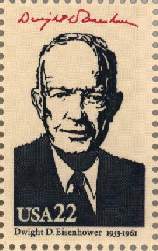![]()
Rhetoric of President Dwight D. Eisenhower
SELECTED BIBLIOGRAPHY
Last Updated: Thursday, 19-Feb-2015 22:25:35 EST

Bose, M., & Greenstein, F. L. (2002). The hidden hand vs. the bully pulpit: The layered political rhetoric of president Eisenhower. In L. G. Dorsey (Ed.), The presidency and rhetorical leadership (pp. 184-199). College Station, TX: Texas A&M University Press.
Chernus, I. (2002). Eisenhower's Atoms for Peace. College Station, TX: Texas A & M University Press.
Crable, R. E. (1977). Ike: Identification, Argument, and Paradoxical Appeal. Quarterly Journal of Speech 63, 188-196.
Freeley, A. J. (1958). Ethos, Eisenhower, and the 1956 Campaign. Central States Speech Journal, 9, 24-26.
Greene, B. P. (2015). “Captive of a Scientific-Technological Elite”: Eisenhower and the Nuclear Test Ban. Presidential Studies Quarterly, 45, 29–45.
Kennedy, T. R. (1956). Eisenhower as extempore speaker. Journal of Communication, 8, 151-155.
Danielson, W. A. (1956). Eisenhower's February decision: A study of news impact." Journalism Quarterly 33, 433-441.
German, K. M. (2004). Mamie Geneva Doud Eisenhower. In M. M. Wertheimer (Ed.) Inventing a voice (pp. 223-242). New York: Rowman & Littlefield.
Goldzwig, S. R., & Dionisopoulos, G. N. (1994). Crisis in Little Rock: Eisenhower, history, and mediated political realities. In M. J. Medhurst (Ed.) Eisenhower's war of words: Rhetoric and leadership (pp. 189-221). East Lansing, MI: Michigan State University Press.
Griffin, C. J. G. (1994). New light on Eisenhower's farewell address. In M. J. Medhurst (Ed.), Eisenhower's war of words: Rhetoric and leadership (pp. 273-284). East Lansing, Michigan State University Press.
Ivie, R. L. (1998). Dwight D. Eisenhower's "Chance for Peace": Quest or crusade? Rhetoric and Public Affairs, 1, 227-243.
Litfin, A. D. (1974). Eisenhower on the Military-Industrial Complex: Critique of a rhetorical strategy. Central States Speech Journal, 25, 198-209.
Marlin, C. L. (1961). Eisenhower before the press." Communication Quarterly, 9, 23-25.
Medhurst, M. J. (2001). Text and context in the 1952 presidential campaign: Eisenhower's "I Shall Go to Korea" speech. Presidential Studies Quarterly, 31, 464-484.
Medhurst, M. J. (2000). Text and context in the 1952 presidential campaign: Eisenhower's "I shall go to Korea" speech. Presidential Studies Quarterly, 30, 464-484.
Medhurst, M. J. (1997). Eisenhower and the crusade for freedom: The rhetorical origins of a Cold War campaign. Presidential Studies Quarterly, 27, 646-661.
Medhurst, M. J. (1994). Eisenhower's war of words: Rhetoric and leadership. East Lansing, MI: Michigan State University Press.
Medhurst, M. J . (1994). Reconceptualizing rhetorical history: Eisenhower’s Farewell Address. Quarterly Journal of Speech, 80, 195-218.
Medhurst, M. J. (1993). Dwight D. Eisenhower: Strategic communicator. Greenwood Press.
Mueller, J. W., & Schame, W. B. (1990)..'Out of Fear and Into Peace': President Eisenhower's address to the United Nations. Social Education, 54, 163-164.
O'Gorman, N. (2008). Eisenhower andt eh American sublime. Quartery Journal of Speech, 94, 44-72.
Parry, P. (2014). Eisenhower: The public relations president. Lexington Books.
Scott, D. K. (2003). The Eisenhower/Khrushchev rhetorical compact: Toward a model of cooperative public discourse. Southern Communication Journal, 68, 287-306.
Scott, R. L. (1995). Eisenhower’s farewell address: Response to Medhurst. Quarterly Journal of Speech, 81, 496-501.
Scott. R. L. (1990). Eisenhower's farewell: The epistemic function of argument. In R. Trapp and J. Schuetz (Eds.) (1990). Perspectives on argumentation: Essays in honor of Wayne Brockriede. Prospect Heights, IL: Waveland Press.
Sillars, M O. (1958). The Presidential Campaign of 1952. Western Journal of Communication, 22 ,: 94-99.
Stern, M. (1990). Presidential strategies and Civil Rights: Eisenhower, the early years." Presidential Studies Quarterly, 19, 769-796.
Tudda, C. J. (2005). "Reenacting the Story of Tantalus": Eisenhower, Dulles, and the failed rhetoric of liberation. Journal of Cold War Studies, 7, 3-35
Zagacki, K. S. (1995). Eisenhower and the rhetoric of postwar Korea. Southern Communication Journal, 60, 233-245.